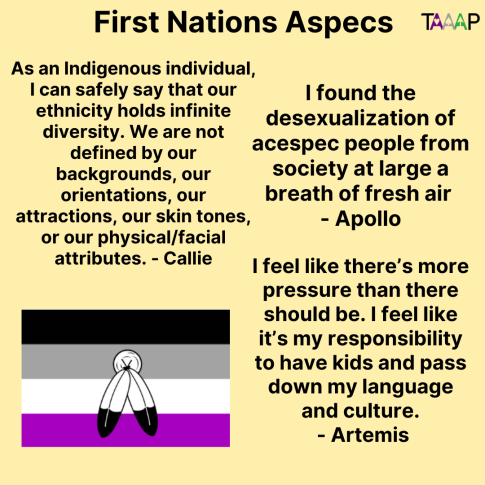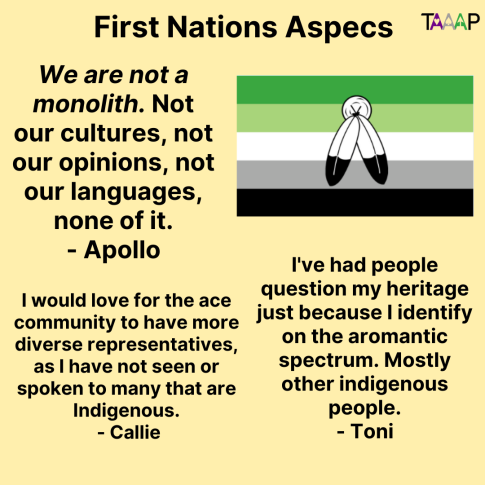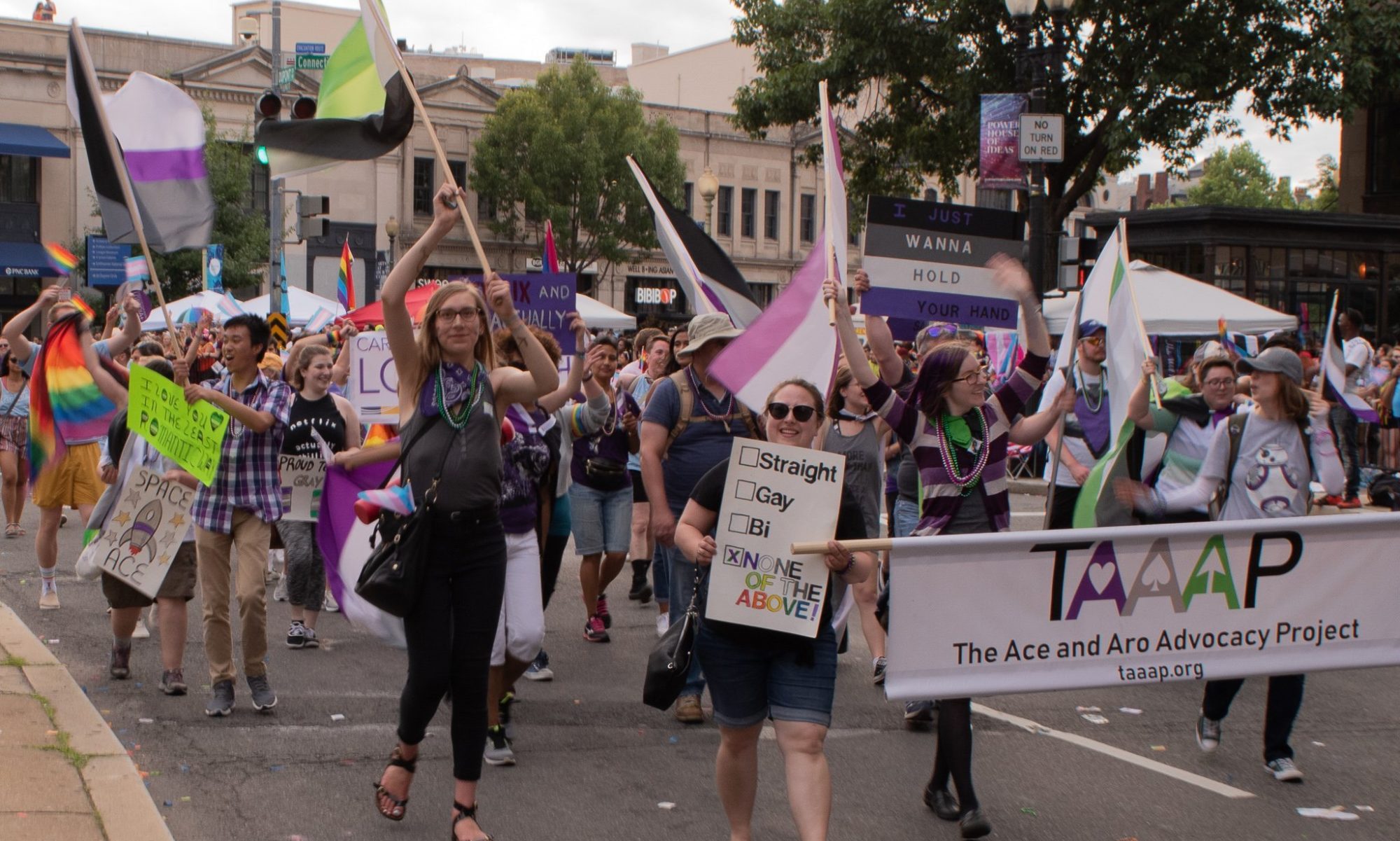

November is Native American Heritage Month, and November 26 is Native American Heritage Day this year in the United States. With that in mind, we decided to focus on the voices of First Nations and Indigenous ace and aro individuals, to show the wide variety of experiences that exist among the many different nations and cultures represented here. Thank you so much to all our contributors!
Introductions
I’m Apollo (he/they/it, whatever on the pronoun front), and I’m generally Arospec and Acespec. I’m Kanien’kéha:ka (Mohawk), and french canadian.
I’m Artemis. I am Cree. I am genderfluid, asexual, gay, and demiromantic. And my pronouns are she/they.
I’m Callie. My aspec identities are aromantic (more specifically lithromantic) and aegosexual. I am half Cherokee and half Passamaquoddy.
I’m Toni. I’m a demiromantic white/Blackfoot person.
How does your race intersect with your orientation?
Apollo: My race and orientation intersect in a bit of a strange way — I can’t discuss how they intersect without also addressing the fact that I’m transmasculine, and how that plays into it. As someone who, while not identifying strictly as a woman, does still identify somewhat as a Native Woman (capitalized), the oversexualization of native women and girls has always affected me in a deep way. It’s made me feel rather objectified, exotified, and sexualized. This made realizing that I’m aspec (in both ways) a pretty big relief. I felt that it was a way to escape that oversexualization that follows me everywhere.
Callie: I would say that it is difficult in my position, as tradition is very heteronormative and allonormative, so my identities are treated as a “choice” (celibacy) instead of a lack of natural (sexual/romantic) attraction.
Toni: Because of colonization and the destruction of culture, there’s this… expectation? I dont want to call it an expectation, because that implies pressure from others. It’s more like an expectation I’ve put on myself… to have someone to pass our culture onto. And I feel as though my aromanticism intersects with my lack of desire for children. I feel kind of guilty for not wanting children to pass that culture onto, especially with the history of forced sterilization on natives. I know it shouldn’t be on my shoulders like that, but I cant help but feel some sort of… shame.
How is your experience in aspec communities impacted by your race, or your experience with other people of the same race impacted by your orientation?
Apollo: My experience with aspec communities is… rocky, when faced with the additional aspect of my race. I don’t connect very well to many white aspecs, as the experiences that they talk about — specifically with being infantilized, if I’m to get specific — aren’t something that I feel apply to me very well, at least in the shared spaces. Like I mentioned in the last paragraph, I found that the … I suppose desexualization is the best word for this? I found the desexualization of acespec people from society at large a breath of fresh air, while I’ve heard others say that it feels demeaning and infantilizing. As for how it feels among my indigneous peers… I actually am friends with more aspec natives than allo natives, so I don’t think I can really talk too much on that on a personal level.
Artemis: I have not had the pleasure of ever meeting another asexual indigenous person. I live in a rather isolated community, so unfortunately other LGBTQIA2S+ people are hard to come by. However I’ve noticed whenever I meet other asexual people in online communities it’s always a little confusing because the immediate assumption is always that you’re white. So it ends up eventually being a conversation. It really is quite a wonder what racist things people will say to you when they think you’re also white.
Callie: Most of the aspec community has been wonderful and accepting. However, in my time I have run into certain factions of aces that have, what I can only assume as, internalized acephobia. And, when I happened to speak to this faction, they attacked me and began saying I had to be “White” because of my views. To be clear this faction had primarily aspec POC. As a POC, I was highly offended and disgusted, that I supposedly could not have certain views while being of my ethnicity. My ethnicity can never be taken from me, and I am very disappointed that this happened from my fellow POC. It was a terrible occurrence, I hope that it does not happen again, and I would love awareness when it comes to this problem.
Toni: I find that, in online spaces mostly, people seem to think that being aspec is a “white people thing”. I’m not sure where this idea came from, but I’ve had people question my heritage just because I identify on the aromantic spectrum. Mostly other indigenous people. There are plenty of indigenous people who, in attempts to weed out race fakers, will often find reasons to deny real indigenous people of their heritage. I’ve had my identity as a queer person, and also specifically an aspec person, be the reason my heritage is called into question, amongst other things. It’s hard to believe that things like this exist sometimes until it happens to you.
How could ace and aro communities better support you?
Apollo: Ace and Aro communities could better support me by actually addressing the racism that’s so prevalent in the community — especially in the aro community. A big thing I’ve found is that a lot of the “community leaders”, especially in larger organizations, are white. This makes it feel like a bit of a… special club, for lack of better wording, where people of colour aren’t strictly welcome — as, even if we’re told we’re welcomed, it’s not pleasant being the only person of colour on an all-white board. When I first joined TAAAP, I will admit that this is something I was worried about experiencing, as I hadn’t been particularly involved with the group previously. Thankfully, that turned out to very much not be the case, and I’m very glad to be working with this group behind the scenes on activism.
Callie: I would love for the ace community to have more diverse representatives, as I have not seen or spoken to many that are Indigenous. It would be very helpful for us to be seen in a greater light.
What do you wish other people knew about you or other First Nations or indigenous aspec people?
Apollo: What I wish aspec people (mainly white ones, honestly) knew about me and other first nations people… We are not a monolith. Not our cultures, not our opinions, not our languages, none of it. I’ve often found myself the only native person in a group of aspecs, and I often wind up being asked things like “well, how do I write a native character? How do I make a native name for my character?” (all said as I am a writer more than anything, and often am asked for writing advice). None of these questions are easily answered! I’m Mohawk, I can’t answer questions you have about your Plains Cree character, or your Shawnee character, or your Lakota character! I can’t answer cultural questions that apply to other tribes for curiosity sake either, as I am not part of those tribes. Please, just… remember that, holy hell.
As for what I wish allo people knew? Largely the same thing, but add in the fact that it’s not a “waste” for an attractive native person to be aspec. I’ve heard that one a few times, for whatever reason, including in reference to myself before. Yes, even from other native people. We also all have different views on what being aspec means, and how it interacts with our native identity; so generalizing and claiming, for example, we all appreciate the desexualization we experience would just be plain incorrect (as I assume other answers to this may back up.)
Artemis: Just that we exist. That the default isn’t and shouldn’t be white.
Callie: As with both allos and other aspec individuals, I would love both to recognize that Indigenous peoples are very diverse even in their own ethnicity. There are so many of us, we are not all the same. We may have different skin tones, and physical attributes, and facial features, etc., but we are all Indigenous. Our outward appearance does not take away our ethnicity. So many non-Indigenous people, have a stereotypical image in mind for what an Indigenous person “should” look like, and that is disgustingly racist.
What do you wish people of your racial and/or ethnic background knew about asexuality or aromanticism?
Callie: As for our own Indigenous peoples, they often follow a traditional heteronormative/ allonormative mindset. They have a preset in mind of what our sexuality/romanticism must be, especially when it comes to gender. It is expected of us to fall in line with heteronormativity and allonormativity. So, as an asexual, it is equally detrimental to have this identity, as it would be of Indigenous peoples of other non-hetero orientations.
Are there any particular ways your orientation has impacted particular cultural expectations of you?
Apollo: Marriage. Child-rearing. Being aspec has very much impacted those cultural expectations of me (as does being trans.) I’m still… There’s a sense of disappointment, since I won’t be bringing in another mouth to feed for the family, someone to help care for my parents, aunts, uncles, etc as they get older. However, I’ve also faced a lot of support for this, as there’s still a sense of devotion I have to my community. I still help out others, I will be the caretaker, I can aid others’ children, etc. Despite that disappointment, there’s also a sense of understanding that I’m still a part of the community, and that I still will be helping out others.
Artemis: I’ve always felt that there’s this expectation to have kids and find a partner and settle down. But at the end of the day if I ever have kids it won’t be naturally. Sex just repulses me. I think this expectation isn’t just in indigenous communities but I feel like it’s a lot worse in our communities. After residential schools, MMIW, drinking water crisis, just everything, I feel like there’s more pressure than there should be. I feel like it’s my responsibility to have kids and pass down my language and culture. Which don’t get me wrong – I will be passing down my culture and language, we shouldn’t have to go to university to learn our own language. But I don’t think I’ll be passing it down to my own children.
Have you ever had an especially positive interaction between your orientation and culture? If so, what was it? If not, what do you wish you could experience?
Callie: If I could have a positive experience in my culture, it would be to actually find other Indigenous aspecs, that we may form a sub-community for ourselves. As I have said earlier, I also desperately desire more Indigenous representatives of the aspec community, to speak for us, that we may be heard and seen. We do exist. And people need to see that we do.
How did coming out feel (if you are out) when considering the intersections of your race and culture? If you aren’t out, then are there any particular pressures you’ve felt/are feeling that relate to your racial/ethnic/cultural identity that are holding you back?
Apollo: Coming out was… strange. I originally came out back before I started my journey with reconnecting to my culture, so there aren’t any specific stories I have from that time. However, being out in these native spaces, being an active part of my culture now, is largely a positive thing. There’s an attempt at understanding, even if I still get questions like “Are you interested in anyone?” from people. It’s been a pretty positive experience overall.
Callie: I have only been able to come out to one person in my family. The rest radically follow the dogma of heteronormativity, and despise those who are non-hetero. They do not believe in asexuality, only celibacy. It is very crushing to know that if I were to come out to my very own loved ones, I would be scrutinized and criticized, and quite possibly ostracized, for an identity I cannot control.
Any final thoughts that you wish to share that may not fit under any of the specific questions asked?
Apollo: I don’t think there’s any additional things I want to say, other than #LandBack is not a metaphor, and Support Wet’suwet’en Strong!
Artemis: I feel like there’s just not enough asexual representation in modern media. And then even the indigenous representation is sometimes out there but even that isn’t always good. I’ve always struggled with finding people like me to look up to. I was 14 the first time I read a popular book that actually had a native character who wasn’t just a side character. It’ll definitely be a hell of a lot longer before I see a native asexual character in modern media.
Callie: As an Indigenous individual, I can safely say that our ethnicity holds infinite diversity. We are not defined by our backgrounds, our orientations, our attractions, our skin tones, or our physical/facial attributes. We are defined by our blood. And no one has the right to take that away from us. We are here, and we will continue working to have the cultural recognition and acknowledgement that we deserve.
